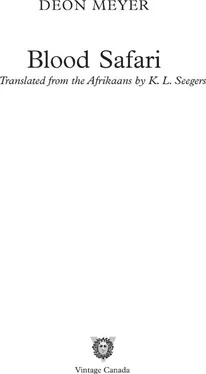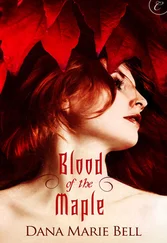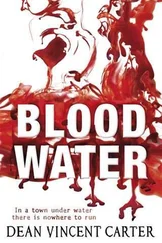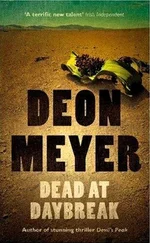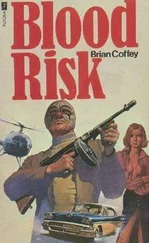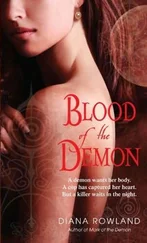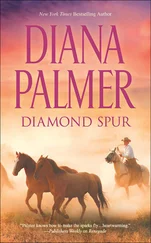Deon Meyer - Blood Safari
Здесь есть возможность читать онлайн «Deon Meyer - Blood Safari» весь текст электронной книги совершенно бесплатно (целиком полную версию без сокращений). В некоторых случаях можно слушать аудио, скачать через торрент в формате fb2 и присутствует краткое содержание. Жанр: Старинная литература, на английском языке. Описание произведения, (предисловие) а так же отзывы посетителей доступны на портале библиотеки ЛибКат.
- Название:Blood Safari
- Автор:
- Жанр:
- Год:неизвестен
- ISBN:нет данных
- Рейтинг книги:4 / 5. Голосов: 1
-
Избранное:Добавить в избранное
- Отзывы:
-
Ваша оценка:
- 80
- 1
- 2
- 3
- 4
- 5
Blood Safari: краткое содержание, описание и аннотация
Предлагаем к чтению аннотацию, описание, краткое содержание или предисловие (зависит от того, что написал сам автор книги «Blood Safari»). Если вы не нашли необходимую информацию о книге — напишите в комментариях, мы постараемся отыскать её.
In Blood Safari
A complicated man with a dishonorable past, Lemmer just wants to do his job and avoid getting personally involved. But as he and Emma search for answers from the rural police, they encounter racial and political tensions, greed, corruption, and violence unlike anything they have ever known.
Blood Safari — читать онлайн бесплатно полную книгу (весь текст) целиком
Ниже представлен текст книги, разбитый по страницам. Система сохранения места последней прочитанной страницы, позволяет с удобством читать онлайн бесплатно книгу «Blood Safari», без необходимости каждый раз заново искать на чём Вы остановились. Поставьте закладку, и сможете в любой момент перейти на страницу, на которой закончили чтение.
Интервал:
Закладка:
I realised of whom the man reminded me. There had been a lay preacher in jail, a born-again armed robber from the Cape Flats by the name of Job Tieties. Bible in hand, he would preach at night, to himself and a handful of approving brothers. His voice carried through the cells with that same urgent, evangelistic fervour.
The Cape vulture/Kransaasvoel/ Cryps coprotheres , once so numerous in Africa, was totally wiped out in Swaziland, on the critically endangered list in Namibia, and there remained only two thousand breeding pairs worldwide. ‘Two thousand. Imagine just two thousand people left in the whole world. Just try and imagine that. A century ago, there were one hundred thousand Cape vultures in South Africa. This incredible bird with a wingspan of two and a half metres that can spend the whole day gliding on the thermals over the African veld, covering seven hundred and fifty kilometres effortlessly – that’s the direct distance between Bloemfontein and Cape Town. Just two thousand breeding pairs left. A travesty, a tragedy, a disaster. Why? Why should we worry that they are disappearing, these disgusting, ugly, dirty birds?’
Because nature was a delicate piece of engineering, he said. It was God’s timepiece, where every little gear, every tiny spring, was of vital importance to keep perfect ecological time. ‘Allow me to explain: every vulture had its place, its function, its role to play. Different vultures consumed different parts of the carcass – the body and beak of each was adapted for a specific task. The hooded vulture/Monnikaasvoël/ Necrosyrtes monachus would be the first to feed. Its sharper, smaller beak could rip open the hide of the dead animal. It would be a hurried affair in order to snatch a few strips of meat before the larger, dominant scavengers arrived. But it was indispensable; without it the others could not get at the innards.’
The Cape vultures were the riff-raff of carrion. Eternally soaring high above the African veld, they would look for the lions and hyenas, crows, ravens and jackals that would indicate a carcass was ready. Then, they would swoop down in huge flocks, spiralling towards the earth in wide circles and gathering in rowdy bunches close to the feeding ground to be sure it was safe. And so the maul would begin, the great scrum to get at the carcass. Its bald neck marked it as an internal feeder. The giant beak and strong tongue shaped like a trowel would tear out great chunks of meat – it could swallow a kilogram of carrion in three minutes.
‘But the king of the carcass is the lappet-faced vulture/Swar- taasvoël/Aegypius tracheliotos. It stands a metre high.’ He indicated with his hand above the ground. ‘It has a wingspan of almost three incredible metres, just about twice the size of any other vulture, and it does not take shinola from any of them. Lappets can travel up to one thousand, one hundred kilometres through the sky, arrive late at the carcass, and then dominate. But here’s the interesting thing: despite their size and their attitude, they don’t compete for food with other species, because they are specifically adapted to eat the skin and ligaments – and they are the only ones to do so. Isn’t that something?’
Heads nodded in wonder around us. I had to concede; he was good.
Nature wastes nothing, Donnie Branca said. There was even a vulture to clean up the bones: the lammergeier. Frequently, it would be first at a kill, but would wait nervously at the side until there were bones available. Small bits of bone would be swallowed whole: ‘it’s sometimes comical to see the bone go down sideways in the throat’. The lammergeier would take larger bones up into the air and drop them from a great height to shatter on the rocks, so that it could pick them up and swallow them.
‘If we poison them, if Escom’s power cables kill them when they dive into them, if the farmers shoot them or take away their breeding grounds, the ticking of God’s clock will stop. Not only for them, ladies and gentlemen, but also for all of nature. Rotting carcasses breed blowflies and disease, which spreads to mammals, reptiles and other birds. Often to human beings as well. Food chains get broken, the delicate balance is disturbed, and the whole system comes crashing down. That’s why we care for vultures at Mogale, that’s why we love them. That’s why we sit with poisoned birds through many nights to nurse them back to health, that’s why we detoxify them, mend their wings, feed them with great patience and release them back into the wild. You can’t breed them in captivity, but you can heal them, save the injured and the sick. You can go out and educate farmers and sangomas, talk to them, plead with them, explain to them that nature is a finite resource, a delicate, fragile instrument. But it takes facilities and manpower, training, food, dedication and focus. And all of these things cost money. We get no financial aid from the government. Mogale is a private initiative, kept alive by volunteers working long hours, seven days a week – and contributions from people like you. People who care, people who would like their children to see a Cape vulture spread its awesome wings and ride the African thermals ten, twenty, fifty years from now.’
Donnie Branca stopped for a short, meaningful moment. I was ready to give him money. ‘We also have breeding programmes for servals, wild dogs, leopards and cheetahs,’ said Branca. Beside me, Emma shook her head and said softly, ‘No.’
I looked at her in surprise. ‘Poor branding,’ she whispered. ‘I’ll explain later.’
Then Donnie Branca invited us to view the animals with him.
11
Emma stood in the big cage with a huge glove on her right hand, holding a strip of meat. The Cape vulture flew up from the ground with the noise of a spinning windmill and landed on the glove with extended talons. Its giant wings, spread wide for balance, dwarfed her, and it was so heavy that she had to support her outstretched arm with the other.
‘Hold that meat as tightly as you can,’ Donnie Branca said, but to no avail. The beak took hold of the strip and pulled it effortlessly from her grasp.
I stood behind the other visitors at the door to the cage, watching the childlike wonder on Emma’s face.
‘Jislaaik,’ she said, and the vulture flew off her hand, stroking her short hair with its long wing feathers. The crowd applauded.
Donnie Branca stood at the gate, just beyond the collection box, to thank the visitors and wish them goodbye. Emma made sure we were at the back. Branca smiled at her and put out a hand. ‘You were a real trooper with the feeding,’ he said.
‘Mr Branca.’ She shook his hand.
‘Call me Donnie.’ He liked her.
‘My name is Emma le Roux. I would like to talk to someone about Jacobus de Villiers.’
It took him a second to change gear. The perfect white teeth disappeared. ‘Cobie?’
‘Yes,’ said Emma.
Branca looked at her as if seeing her for the first time, with much-diminished interest. ‘Are you from the papers?’
‘I’m a consultant from Cape Town. Jacobus is my brother.’ She zipped open her handbag.
‘Your brother?’
Emma took out her photo. She handed it to Branca. He took it and studied it intently.
‘But Cobie … I thought…’ He passed the picture back to her. ‘I think you should talk to Frank.’
‘Frank?’
‘Frank Wolhuter. The manager.’
Frank Wolhuter’s office did not have air conditioning. It smelt strongly of animals, sweat and pipe tobacco. He got up and offered Emma his hand, blue eyes scanning her up and down. He was as sinewy as biltong, with ajan Smuts goatee and thick grey hair long in need of a trim. He introduced himself with the happy smile of a man expecting good news.
Читать дальшеИнтервал:
Закладка:
Похожие книги на «Blood Safari»
Представляем Вашему вниманию похожие книги на «Blood Safari» списком для выбора. Мы отобрали схожую по названию и смыслу литературу в надежде предоставить читателям больше вариантов отыскать новые, интересные, ещё непрочитанные произведения.
Обсуждение, отзывы о книге «Blood Safari» и просто собственные мнения читателей. Оставьте ваши комментарии, напишите, что Вы думаете о произведении, его смысле или главных героях. Укажите что конкретно понравилось, а что нет, и почему Вы так считаете.
